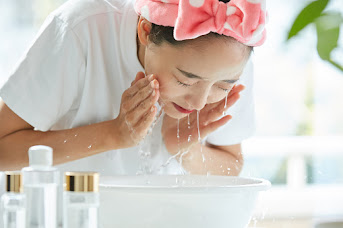Can
I wash my face with tap water? The answer to that short question is
“NO!”. Tap water does cause acne, dryness, irritation, and even breakouts
because it can clog your pores.
If
you drink or wash your face with tap water, you should stop. Acne has been
linked to tap water in studies.
People
have always assumed that drinking unfiltered tap water is safe. But did you
know that municipal tap water is chlorinated? Vitamin E and polyunsaturated
fatty acids are destroyed by chlorinated water.
Acne
breakouts and skin tissue damage resulting from a lack of these fatty acids and
vitamins.
What
is the purpose of chlorinating the water? This action is designed to kill
harmful bacteria in water, making it safe for public consumption and use.
However, chlorinated water destroys skin cells, beneficial bacteria, and
vitamins.
Read: Top Nail Trends of Spring 2023
When
you drink tap water, the chlorine in the water kills intestinal flora while
also producing free radicals. Because free radicals exist, your hair follicles
will clog more easily, which is a direct cause of acne.
Free
radicals also weaken your immune system, causing the sebaceous gland to secrete
more sebum through your skin, which is another direct cause of acne.
Consider
this: if you continue to wash your face with tap water, you are exacerbating
your acne problem.
The
best and simplest solution to this problem is to install a basic water
filtration system in your home, allowing you to consume and use water that is
free of chlorine and other heavy metal elements found in tap water. If you do
this, you will notice a difference in your acne condition.
Now
that you’re aware of the dangers of tap water, install a water filter in your
home right away.
Read: Bye Bye Blackheads Some By Mi
FAQs Related To Can I Wash My Face With Tap
Water
What water is best to wash your face with?
While
lukewarm water is preferable for washing your face, cold water also has
advantages. Because cold water tightens the appearance of your skin, you may
appear renewed and refreshed. It also increases circulation, which can
temporarily improve the appearance of your skin.
Can washing your face with tap water cause
acne?
Washing
your face with tap water is harsh on your skin. It can cause acne by drying out
the skin and increasing inflammation, according to her.
Does tap water affect the skin?
Chlorinated
water can deplete the skin’s natural oils and hydration, exacerbating skin
conditions like eczema.
Can I wash my face with kitchen sink water?
Most
people use tap water to wash their faces, which is fine as long as you know
whether your water is hard or soft. Water can be found with more dissolved
minerals (which results in hard water with a high pH) or without many minerals
(soft water, with a low pH).
Read: Hydrafacial Blackheads
What happens if you tap your face everyday?
When
you touch your face, you spread oil from one side of your face to the other.
The act of touching your face can also clog your pores, leading to an outbreak
of acne.
Can cold water remove pimples?
Washing
your face with cold water is said to be very beneficial for acne sufferers
because it can reduce the extent of swelling and inflammation, particularly
around acne-prone areas. There is, however, no scientific evidence to support
this claim.
Can I wash my face with soap?
As
soap is designed to remove bacteria and dirt, the foaming agents strip your
skin and leave it dry and irritated, which is why hand lotion sales have
skyrocketed during the COVID-19 pandemic. In general, you should avoid washing
your face with soap.
Is it better to wash your face with Bottled
Water?
When
washing your face, avoid using water from the sink, according to a tip I
learned. Use purified water or water from a bottle. That’s the water you want
to use on your face, not the water from the sink, which contains chemicals and
promotes bacteria growth.
Read: Say Goodbye To Large Pores And Blackheads
What in water makes skin break out?
The
impurities in your tap water, combined with the high mineral content, form a
layer of soap on top of your skin and clog your pores, contributing to
breakouts.
Can different types of water cause acne?
Other
heavy metals found in hard water, such as copper, iron, lead, and zinc, can
also cause skin issues, with calcium and magnesium causing skin oils to become
comedogenic and form waxy plugs that clog pores and cause further breakouts,
inflammation, flare-ups, and irritation.
What are the negative effects of tap water?
Contaminants
in our water can cause gastrointestinal illness, reproductive problems, and
neurological disorders. Infants, young children, pregnant women, the elderly,
and people with compromised immune systems are more likely to become ill after
drinking contaminated water.
Read: How can you prevent breakouts?
Can tap water cause itchy skin?
An
excess of chlorine is one of the worst things you can experience when it comes
to contaminants in your tap water in terms of your skin.
Can water glow skin?
You
can also drink water to make your skin glow. In addition to splashing warm
water on your face to open pores and cold water to close pores, drinking enough
water will contribute to your healthy glow by delivering essential nutrients to
your skin cells and replenishing your skin.
Can I wash my face with table salt and water?
Salt
cleanses pores deeply, balances oil production, and inhibits bacteria that
cause breakouts and acne. Try it: In a small spray bottle, combine one teaspoon
of sea salt and four ounces of warm water until the salt is dissolved. Spray on
clean, dry skin, avoiding the eyes. Use once or twice a day.
Recommended For You:
Top Nail Trends of Spring 2023


